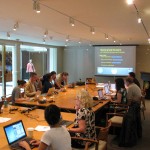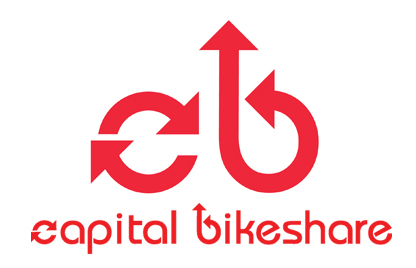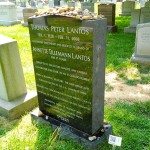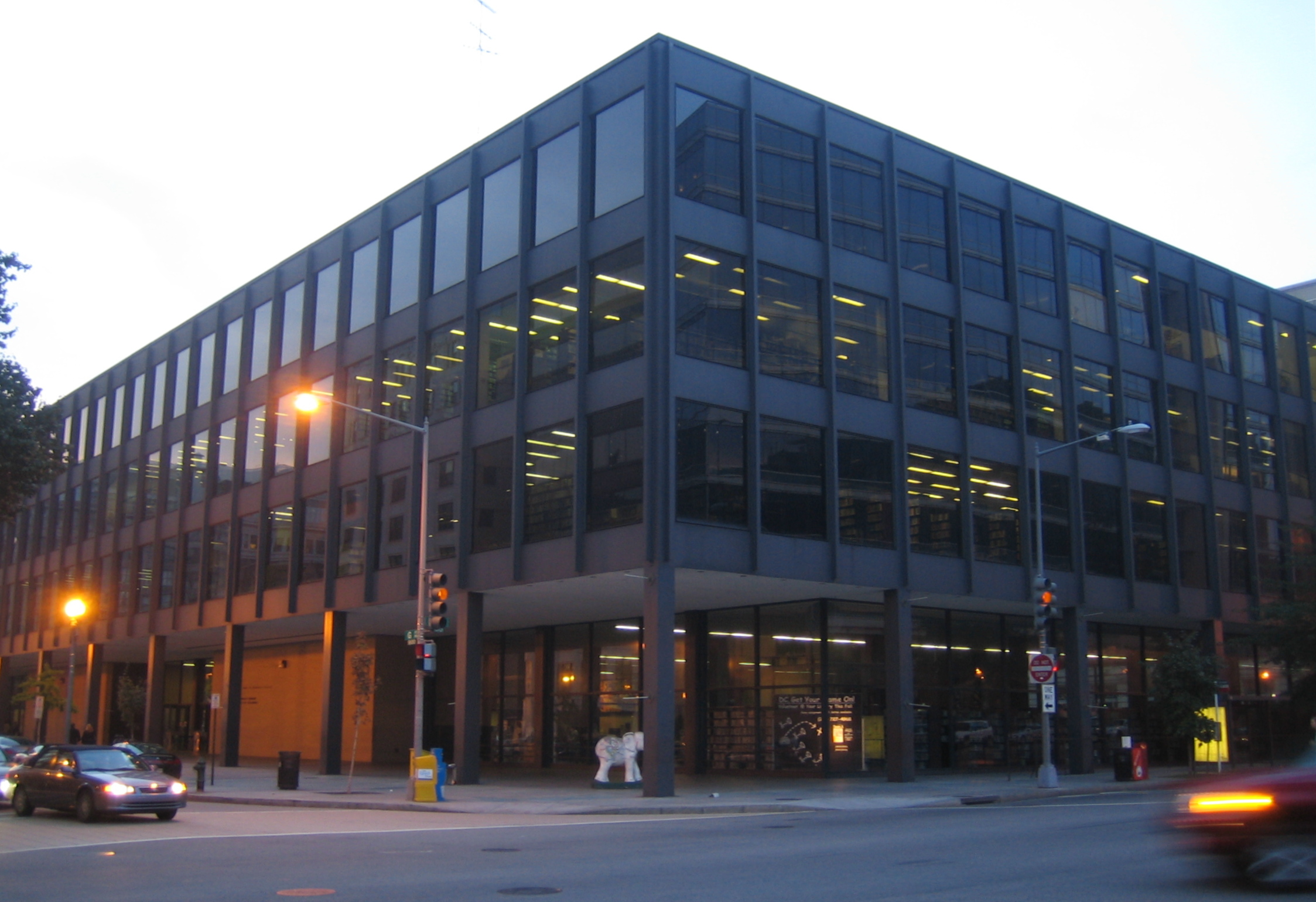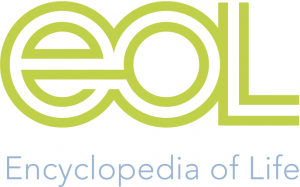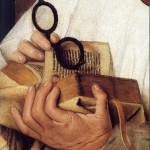Getting to Know You, GLAM
Posted by LisaMarrs on August 14th, 2012
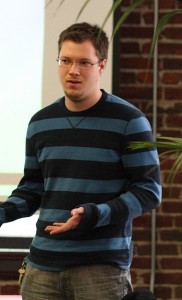
Dominic McDevitt-Parks during Campus Ambassador training
GLAM, the Wikimedian acronym for Galleries, Libraries, Archives, and Museums, equates to more than just the institutions categorized by the letters. It also encompasses the merging of communities. On August 13, 2012, Dominic McDevitt-Parks, the wikipedian-in-residence at the National Archives and Records Administration since May 2011, gave a talk labeled “Cultural Institutions and Wikipedia: a Mutually Beneficial Relationship” on what a symbiotic relationship between Wikipedia and a cultural institution can look like.
Introducing Dominic was Wikimedia DC’s own Kristin Anderson, who described the Wikipedian community to the Library of Congress audience as “the only people who like information as much as library catalogers are Wikipedians…Wikipedia and the Library of Congress share Thomas Jefferson’s dream of…information for everyone.”
In his talk, Dominic broke down how cultural institutions and Wikipedia can work together to form mutually beneficial partnerships. If the goal of an institution is to encourage the use of its materials, Wikipedia is a natural fit, being the 5th largest internet site. Dominic gave numbers and a visual to put it all into perspective. The National Archives website gets 17 million views a day. In contrast, a very conservative estimate of the number of views that the Wikipedia articles that use National Archives material receive every day is well over a hundred million. This isn’t pointing at a problem, but at a fact, and one that can lead to a solution for many institutions; Wikipedia provides a ready-made platform to spread not only information through articles, but also to put up source documents on sister projects Wikisource and Wikimedia Commons.
The National Archives takes full advantage of this online volunteer community by encouraging local Wikipedians to come to scan-a-thons and the online Wikipedian community to tag the uploaded scans and transcribe the text documents on WikiSource. Due to the tireless efforts of many Wikipedians, well over a hundred thousand documents have been scanned in and transcribed.
Even if the question of whether or not Wikipedia is a reliable source is raised, if a person sees a mistake on Wikipedia, it is up to him or her to make the change. Unlike other encyclopedias or collections, if people find a mistake on Wikipedia or one of its sister projects, they can correct it. There is a large community of editors watching to make sure the information is as accurate as possible. Recognizing that its own information is not infallible, the Archives has created a feedback page on its own website for people to post mistakes and corrections on.
Dominic summarized the role of a Wikipedian-in-residence nicely: the Wikipedian-in-residence provides access to the institution to the Wikipedia community and vice versa, which brings about not only community engagement, but also culture change within the institution itself, making it more open and accessible to the layperson. This is change which the National Archivist David Ferriero heartily embraces and encourages, in the words of one blogger during the National Archives ExtravaSCANza in 2011, “If it’s good enough for the National Archivist, it’s good enough for you.”
Lisa Marrs, Outreach & Program Coordination, Wikimedia DC

Dominic McDevitt-Parks during Campus Ambassador training
GLAM, the Wikimedian acronym for Galleries, Libraries, Archives, and Museums, equates to more than just the institutions categorized by the letters. It also encompasses the merging of communities. On August 13, 2012, Dominic McDevitt-Parks, the wikipedian-in-residence at the National Archives and Records Administration since May 2011, gave a talk labeled “Cultural Institutions and Wikipedia: a Mutually Beneficial Relationship” on what a symbiotic relationship between Wikipedia and a cultural institution can look like.
Introducing Dominic was Wikimedia DC’s own Kristin Anderson, who described the Wikipedian community to the Library of Congress audience as “the only people who like information as much as library catalogers are Wikipedians…Wikipedia and the Library of Congress share Thomas Jefferson’s dream of…information for everyone.”
In his talk, Dominic broke down how cultural institutions and Wikipedia can work together to form mutually beneficial partnerships. If the goal of an institution is to encourage the use of its materials, Wikipedia is a natural fit, being the 5th largest internet site. Dominic gave numbers and a visual to put it all into perspective. The National Archives website gets 17 million views a day. In contrast, a very conservative estimate of the number of views that the Wikipedia articles that use National Archives material receive every day is well over a hundred million. This isn’t pointing at a problem, but at a fact, and one that can lead to a solution for many institutions; Wikipedia provides a ready-made platform to spread not only information through articles, but also to put up source documents on sister projects Wikisource and Wikimedia Commons.
The National Archives takes full advantage of this online volunteer community by encouraging local Wikipedians to come to scan-a-thons and the online Wikipedian community to tag the uploaded scans and transcribe the text documents on WikiSource. Due to the tireless efforts of many Wikipedians, well over a hundred thousand documents have been scanned in and transcribed.
Even if the question of whether or not Wikipedia is a reliable source is raised, if a person sees a mistake on Wikipedia, it is up to him or her to make the change. Unlike other encyclopedias or collections, if people find a mistake on Wikipedia or one of its sister projects, they can correct it. There is a large community of editors watching to make sure the information is as accurate as possible. Recognizing that its own information is not infallible, the Archives has created a feedback page on its own website for people to post mistakes and corrections on.
Dominic summarized the role of a Wikipedian-in-residence nicely: the Wikipedian-in-residence provides access to the institution to the Wikipedia community and vice versa, which brings about not only community engagement, but also culture change within the institution itself, making it more open and accessible to the layperson. This is change which the National Archivist David Ferriero heartily embraces and encourages, in the words of one blogger during the National Archives ExtravaSCANza in 2011, “If it’s good enough for the National Archivist, it’s good enough for you.”
Lisa Marrs, Outreach & Program Coordination, Wikimedia DC
